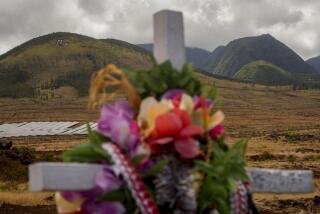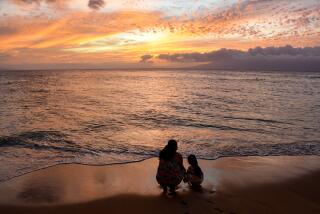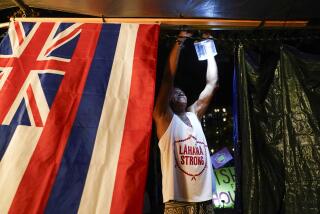On isolated Molokai, relax far from Hawaii’s well-worn tourist paths
- Share via
Isolated Molokai has long lured the intrepid off Hawaii’s well-worn tourist paths. The 260-square-mile island, home to just 7,000 residents, is proudly and fiercely resistant to change. If you can embrace the dearth of man-made attractions and adjust to the slow-paced way of life, you might find yourself relaxing and joining the locals as they wave at passersby.
The tab: I spent $926 for a three-day, two-night adventure, including accommodations, meals and inter-island airfare from Kailua-Kona and would do it again in a heartbeat.
From LAX, United, Delta, Virgin America and Hawiian offer connecting service (change of planes). Restricted round-trip fares begin at $756, including taxes and fees.
Five ideas for the perfect Hawaiian getaway »
The bed
Most visitors choose a home stay on Molokai, but this time I tried my luck at the island’s only hotel: Hotel Molokai (1300 Kamehameha V Highway, Kaunakakai; [877] 553-5347. From $170.) Rooms in the ’60s-style Polynesian bungalows can be stuffy — there’s no air conditioning — and lack a cellphone signal, but otherwise have everything you need for a home base. Its Hale Kealoha restaurant serves residents and visitors and features nightly Hawaiian-style entertainment, often starring the owner and head chef.
The meal
Dining out on Molokai means limited hours and fried plate lunches, pasta and burgers. But there are highlights. If you can ignore the fight-or-flight response that kicks in while walking to the Kanemitsu Bakery’s not-so-secret window along a darkened alleyway in after-hours Kaunakakai, you’ll be rewarded with a plastic-bag bounty: piping hot bread rounds halved and slathered with your choice of butter, cream cheese, cinnamon, strawberry or blueberry spread or a combo of all five (follow the alleyway to the right of 79 Ala Malama Ave. Hot bread is sold from 7:30 p.m. Tuesdays-Sundays; inside bakery open 5:30 a.m-5 p.m. Wednesdays-Mondays, cash only). It’s hands-down the best thing I ate on Molokai.
The find
There’s something comforting and hopeful about kites, especially if they’re colorful and hand-sewn. Visitors to the Big Wind Kite Factory (120 Mauna Loa Highway, Maunaloa; [808] 552-2364, basic kites from $35, windsocks from $25-$65), on a windswept stretch of western Molokai, can watch employees stitch the owners’ patterns on several dozen creations daily. My favorite is a diamond-shaped windsock fashioned to look like a Humuhumunukunukuapuaa, Hawaii’s reef-dwelling state fish.
The lesson learned
Most of Molokai’s rewards must be earned, and many of my favorite moments were unplanned. Flash-flood warnings twice canceled a Halawa Valley jungle hike (Adults $60, $35 for kids). To fill the time, I took a dry, dusty walk along a rental-car-impassable track on the northern coast to catch a glimpse of the sacred sand dunes at Moomomi Preserve. On my final day, the 3 1/2-mile round-trip hike to Halawa Valley proved worth the wait. Our small group forded a thigh-high river to reach gushing falls and hidden temples in the valley. Along the way we heard stories about Molokai’s oldest settlement from its longest still-resident family.
More to Read
Sign up for The Wild
We’ll help you find the best places to hike, bike and run, as well as the perfect silent spots for meditation and yoga.
You may occasionally receive promotional content from the Los Angeles Times.






